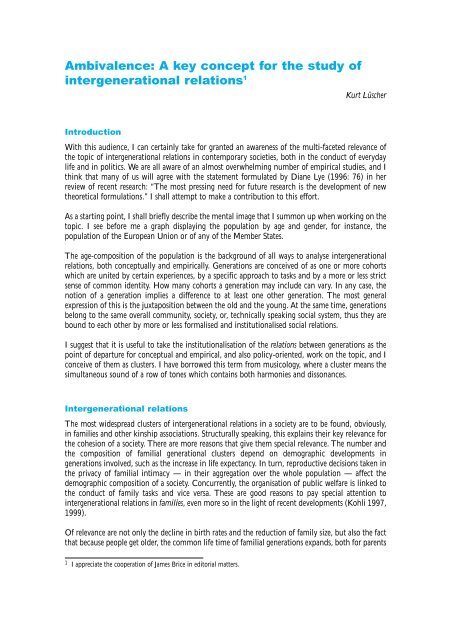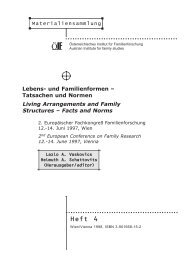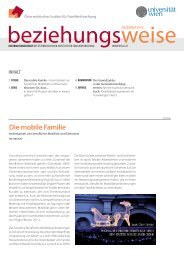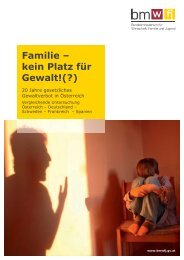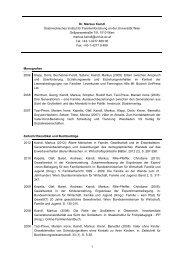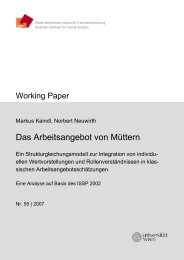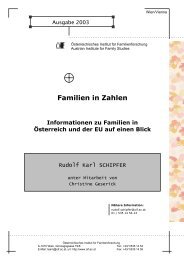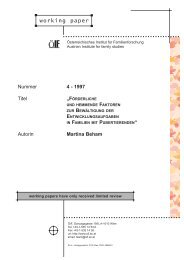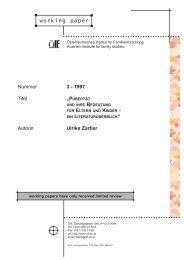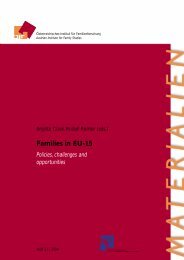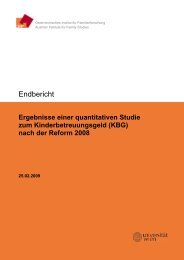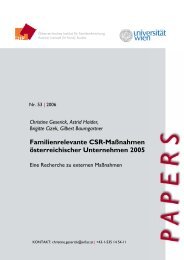Family issues between gender and generations
Family issues between gender and generations
Family issues between gender and generations
You also want an ePaper? Increase the reach of your titles
YUMPU automatically turns print PDFs into web optimized ePapers that Google loves.
Ambivalence: A key concept for the study of<br />
intergenerational relations 1<br />
Kurt Lüscher<br />
Introduction<br />
With this audience, I can certainly take for granted an awareness of the multi-faceted relevance of<br />
the topic of intergenerational relations in contemporary societies, both in the conduct of everyday<br />
life <strong>and</strong> in politics. We are all aware of an almost overwhelming number of empirical studies, <strong>and</strong> I<br />
think that many of us will agree with the statement formulated by Diane Lye (1996: 76) in her<br />
review of recent research: “The most pressing need for future research is the development of new<br />
theoretical formulations.” I shall attempt to make a contribution to this effort.<br />
As a starting point, I shall briefly describe the mental image that I summon up when working on the<br />
topic. I see before me a graph displaying the population by age <strong>and</strong> <strong>gender</strong>, for instance, the<br />
population of the European Union or of any of the Member States.<br />
The age-composition of the population is the background of all ways to analyse intergenerational<br />
relations, both conceptually <strong>and</strong> empirically. Generations are conceived of as one or more cohorts<br />
which are united by certain experiences, by a specific approach to tasks <strong>and</strong> by a more or less strict<br />
sense of common identity. How many cohorts a generation may include can vary. In any case, the<br />
notion of a generation implies a difference to at least one other generation. The most general<br />
expression of this is the juxtaposition <strong>between</strong> the old <strong>and</strong> the young. At the same time, <strong>generations</strong><br />
belong to the same overall community, society, or, technically speaking social system, thus they are<br />
bound to each other by more or less formalised <strong>and</strong> institutionalised social relations.<br />
I suggest that it is useful to take the institutionalisation of the relations <strong>between</strong> <strong>generations</strong> as the<br />
point of departure for conceptual <strong>and</strong> empirical, <strong>and</strong> also policy-oriented, work on the topic, <strong>and</strong> I<br />
conceive of them as clusters. I have borrowed this term from musicology, where a cluster means the<br />
simultaneous sound of a row of tones which contains both harmonies <strong>and</strong> dissonances.<br />
Intergenerational relations<br />
The most widespread clusters of intergenerational relations in a society are to be found, obviously,<br />
in families <strong>and</strong> other kinship associations. Structurally speaking, this explains their key relevance for<br />
the cohesion of a society. There are more reasons that give them special relevance. The number <strong>and</strong><br />
the composition of familial generational clusters depend on demographic developments in<br />
<strong>generations</strong> involved, such as the increase in life expectancy. In turn, reproductive decisions taken in<br />
the privacy of familial intimacy — in their aggregation over the whole population — affect the<br />
demographic composition of a society. Concurrently, the organisation of public welfare is linked to<br />
the conduct of family tasks <strong>and</strong> vice versa. These are good reasons to pay special attention to<br />
intergenerational relations in families, even more so in the light of recent developments (Kohli 1997,<br />
1999).<br />
Of relevance are not only the decline in birth rates <strong>and</strong> the reduction of family size, but also the fact<br />
that because people get older, the common life time of familial <strong>generations</strong> exp<strong>and</strong>s, both for parents<br />
1 I appreciate the cooperation of James Brice in editorial matters.


